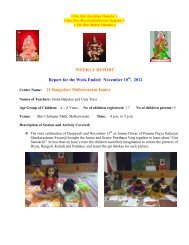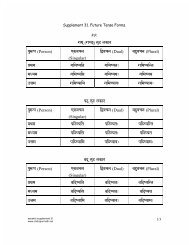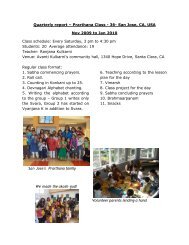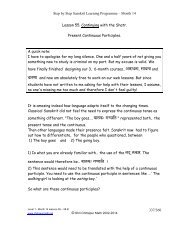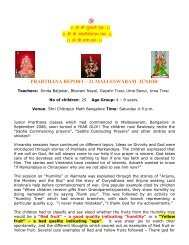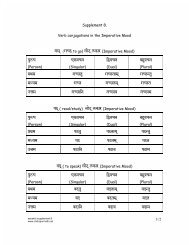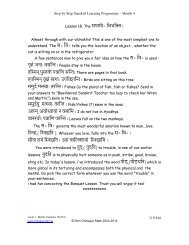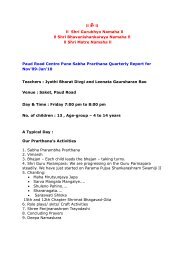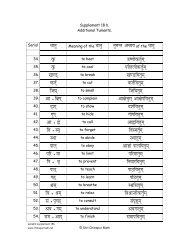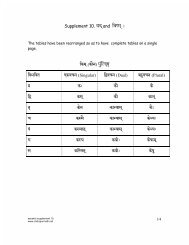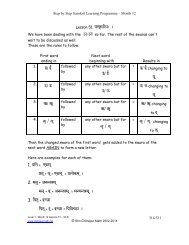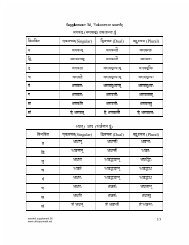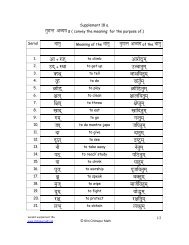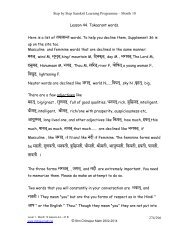Create successful ePaper yourself
Turn your PDF publications into a flip-book with our unique Google optimized e-Paper software.
Step by Step Sanskrit Learning Programme – <strong>Month</strong> <strong>18</strong><br />
Lesson 65.<br />
%pkark/kark- iv_aiKt><br />
iÖtIya iv_aiKt><br />
Level 2. The second vibhakti.<br />
It is time that we take our study of Sanskrit to Level 2. You would have<br />
developed quite a bit of understanding of the language by now. However,<br />
when reading texts or when attempting to translate subhashitas, you might<br />
find yourself wondering why a particular vibhakti has been used and not<br />
another more 'logical' one. The answer is quite simple actually…. grammar<br />
rules. And how!<br />
I'll take you through each vibhakti and list out the words that compel you to<br />
use a particular vibhakti. Explanations/examples follow after the list.<br />
Let's understand a few technical terms first.<br />
• The relationship between a noun and a verb is called kark ,<br />
Therefore any relationship between words that are not connected to a<br />
verb cannot be called a kark ,<br />
• There are six kark s in Sanskrit. ktaR kmR kr[ sMàdan Apadan and<br />
Aixkr[ ie, all the vibhaktis except the sixth.<br />
• The sixth connects to another noun in a sentence and not to a verb<br />
and therefore is not categorized as a kark , For exmple: izvSy puÇ><br />
g[ez> , izvSy connects to puÇ> ,<br />
• Certain indeclinables, AVyys , are used with certain vibhaktis. For<br />
example when ever you use Ai_at> , which means 'all around', you need<br />
to use the second vibhakti. AXyapkm! Ai_at> DaÇa> %pivziNt , The<br />
students sit all around the teacher.<br />
Level 2 - <strong>Month</strong> <strong>18</strong> Lessons 65 - 70.<br />
www.chitrapurmath.net © <strong>Shri</strong> <strong>Chitrapur</strong> <strong>Math</strong> 2002-2014<br />
444/485
Step by Step Sanskrit Learning Programme – <strong>Month</strong> <strong>18</strong><br />
• Vibhaktis which are thus governed by indeclinables are called<br />
%ppdiv_aiKt s.<br />
• Similarly, we have vibhaktis which are governed by verbs. For example,<br />
whenever you use the verb da in any form, the person that the gift is<br />
given to is always'chosen' from the fourth vibhakti. Ah< ramay pu:p<<br />
ddaim , I give Rama a flower.<br />
• These verb-governed vibhaktis are called karkiv_aiKt s.<br />
Now let's get to the job on hand:<br />
Whenever you use the following words, you must use the iÖtIya iv_aiKt><br />
You've already done a few in Level 1. This is the complete list.<br />
The first vibhakti is used only to identify the subject and the number and<br />
gender of the subject. It is not an %ppdiv_aiKt> or a karkiv_aiKt> ,<br />
AVyy><br />
iÖtIya iv_aiKt><br />
1. ‚›·þ£þ (between)<br />
2. ‚›·þ£½µþ (without, excepting, with<br />
reference to, regarding)<br />
3. ‚¹žþ·þ:<br />
4. „žþ¡þ·þ:<br />
5. œþ¹£·þ:<br />
6. œÏ¹·þ<br />
7. ¹¨þ›þþ<br />
8. ¬þ¨þÄ·þ:<br />
9. ¹›þˆÅ«þþ (near)<br />
Level 2 - <strong>Month</strong> <strong>18</strong> Lessons 65 - 70.<br />
www.chitrapurmath.net © <strong>Shri</strong> <strong>Chitrapur</strong> <strong>Math</strong> 2002-2014<br />
445/485
Step by Step Sanskrit Learning Programme – <strong>Month</strong> <strong>18</strong><br />
10. smya (near)<br />
11. −þ (woe be to)<br />
12. ¹šþˆÃÅ (sometimes used with the nominative<br />
or vocative.)<br />
13. %pyuRpir, Axae=x>, AXyix (when nearness is<br />
indicated otherwise use the «þ«Úú )<br />
pd / xatu><br />
1. kmR<br />
2. Verbs signifying " to name", "to choose",<br />
"to make" " to appoint" " to call" " to know"<br />
" to consider" govern the accusative.<br />
janaim Tva< àk&itpué;m! , I know thee to be<br />
the chief person.<br />
3. gm! and all verbs that mean 'to go.'<br />
(greater detail is given in the explanation)<br />
4. àivz! (also with the. s. iv. , and in the ;.<br />
iv. if ANtr is used)<br />
5. ivz! (also with the. s. iv. , and in the ;.<br />
iv. if ANtr is used)<br />
6. àap! (destination)<br />
7. Aix + zI ( General rule to follow: when<br />
intransitive verbs are preceded by an<br />
upasarga, they are governed by the<br />
Accusative: Anu + v&t! = AnuvtRte to follow,<br />
act according to; Aa + éh! = Aaraehit<br />
Level 2 - <strong>Month</strong> <strong>18</strong> Lessons 65 - 70.<br />
www.chitrapurmath.net © <strong>Shri</strong> <strong>Chitrapur</strong> <strong>Math</strong> 2002-2014<br />
446/485
Step by Step Sanskrit Learning Programme – <strong>Month</strong> <strong>18</strong><br />
ascend; Anu + xavit = Anuxavit to run<br />
behind )<br />
8. Aix + Swa<br />
9. Aix + Aas!<br />
10. %p- Anu- Aix- Aa- vs!<br />
11. yj!<br />
12. words denoting duration of space and time<br />
are put in the Accusative.<br />
13. ài[pt! , à[m! ( also dative)<br />
14. dzRyit ( also dative)<br />
15. the secondary object with the root , to<br />
think, takes accusative when contempt is<br />
NOT to be shown.<br />
16. ïÏa governs the accusative. Other words<br />
implying belief and confidence govern the<br />
Locative.<br />
kmRàvcnIym!<br />
prepositions<br />
used as<br />
separate<br />
words NOT<br />
as<br />
upasargas.<br />
1. Anu after, in consequence of, being<br />
indicated by, resembling, imitating.<br />
2. Ai_a before, in<br />
3. %p near, inferior to<br />
4. Ait superior to<br />
5. Anu the side of, along, inferior<br />
Let's look at each one in greater detail:<br />
Level 2 - <strong>Month</strong> <strong>18</strong> Lessons 65 - 70.<br />
www.chitrapurmath.net © <strong>Shri</strong> <strong>Chitrapur</strong> <strong>Math</strong> 2002-2014<br />
447/485
Step by Step Sanskrit Learning Programme – <strong>Month</strong> <strong>18</strong><br />
AVyy><br />
• ‚›·þ£þ (between)<br />
ANtra t< c ta< ¢Nw> , There is a book between him and her.<br />
• ‚›·þ£½µþ (without, excepting, with reference to, regarding)<br />
Tvam! ANtre[ Ah< n gim:yaim , I will not go without you.<br />
tm! ANtre[ kayR< k> ktuR< zKnaeit ? Who can do the work except for him?<br />
ramay[m! ANtre[ @v Ah< @td! Zlaek< vdaim , I say this shloka with<br />
reference to the Ramayana.<br />
ma< ANtre[ tSy k> ivcar> , What is his opinion regarding me?<br />
• ‚¹žþ·þ:<br />
g&hm! Ai_at> v&]a> vtRNte , There are trees all around the house.<br />
• „žþ¡þ·þ:<br />
g&hm! „žþ¡þ·þ: v&]a> vtRNte , There are trees on both sides of the house.<br />
• œþ¹£·þ:<br />
g&h< œþ¹£·þ: v&]a> vtRNte , There are trees all around the house.<br />
• œÏ¹·þ<br />
AXyapk< àit Ahm! AgCDm! , I went towards the teacher.<br />
• ¹¨þ›þþ<br />
Level 2 - <strong>Month</strong> <strong>18</strong> Lessons 65 - 70.<br />
www.chitrapurmath.net © <strong>Shri</strong> <strong>Chitrapur</strong> <strong>Math</strong> 2002-2014<br />
448/485
Step by Step Sanskrit Learning Programme – <strong>Month</strong> <strong>18</strong><br />
Tva< ivna s> iv*aly< gNtu< n #CDit , Without you he does not desire to go<br />
to school.<br />
• ¬þ¨þÄ·þ:<br />
¢am< svRt> pvRta> siNt , There are mountains all around the village.<br />
• ¹›þˆÅ«þþ (near)<br />
mm g&h< ink;a @k> tfag> vtRte , There is a pond near my house.<br />
• smya (near)<br />
mm g&h< smya @k> tfag> vtRte , There is a pond near my house.<br />
• −þ (woe be to)<br />
ha Alsm! ! Woe be to laziness!<br />
• ¹šþˆÃÅ (sometimes used with the nominative or vocative.)<br />
caer< ixk! , Fie upon the thief!<br />
• %pyuRpir, Axae=x>, AXyix (when nearness is indicated otherwise use the<br />
«þ«Úú )<br />
v&]m! %pyuRpir / AXyix me"> , The cloud is just above the tree.<br />
v&]Sy %pyuRpir / AXyix me"> , The sun is far above the tree.<br />
me"m! Axae=x> v&]> , The tree is just below the cloud.<br />
me"Sy Axae=x> v&]> , The tree is far below the cloud.<br />
Level 2 - <strong>Month</strong> <strong>18</strong> Lessons 65 - 70.<br />
www.chitrapurmath.net © <strong>Shri</strong> <strong>Chitrapur</strong> <strong>Math</strong> 2002-2014<br />
449/485
Step by Step Sanskrit Learning Programme – <strong>Month</strong> <strong>18</strong><br />
pd / xatu><br />
• kmR<br />
The object in a sentence is always picked from the second vibhakti.<br />
balk> og< pZyit , The boy sees the bird.<br />
• Verbs signifying 'to name', 'to choose', 'to make', 'to appoint', 'to<br />
call', 'to know', 'to consider' govern the accusative.<br />
janaim Tva< àk&itpué;m! , I know thee to be the chief person.<br />
• gm! and all verbs that mean 'go'<br />
When physical motion is indicated, the place to which it is directed is<br />
either accusative or dative. s> ¢am< / ¢amay gCDit ,<br />
Mental motion is indicated, the place to which it is directed is accusative.<br />
hir ìjit ,<br />
• àivz! (also with the. s. iv. , and in the ;. iv. if ANtr is used)<br />
• ivz! (also with the. s. iv. , and in the ;. iv. if ANtr is used)<br />
sa g&h
Step by Step Sanskrit Learning Programme – <strong>Month</strong> <strong>18</strong><br />
Anu + xav! = Anuxavit to run behind)<br />
og> zaoa< Aixzete , The bird sleeps upon the branch.<br />
• Aix + Swa<br />
s> AasNd< Aixit:Qit , He occupied ( stood upon) the chair.<br />
• Aix + Swa<br />
s> AXyaSte g&hm! , He sits in the house.<br />
• %p- Anu- Aix- Aa- vs!<br />
All these upasargas when added to vs! retain the original meaning of the<br />
word 'to stay'. Without the upasarga, vs! is used with the s. iv<br />
izv> kElasm! %p-Anu-Aix-Aa-vsit , Shiva lives in Kailasa.<br />
izv> kElase vsit , Shiva lives in Kailasa.<br />
• yj! the person to whom the sacrifice is offered is put in the<br />
Accusative and the means or the thing by which the sacrifice is made is<br />
put in the instrumental. pzuna éÔ< yjte He sacrifices a bull to Rudra.<br />
• Words denoting duration of space and time are put in the Accusative.<br />
³aez< kuiqla ndI The river runs winding for two miles.<br />
n vv;R v;aRi[ Öadz dzzta]> The thousand eyed Indra did not 'rain' for<br />
twelve years.<br />
• ài[pt! , à[m! ( also dative)<br />
Level 2 - <strong>Month</strong> <strong>18</strong> Lessons 65 - 70.<br />
www.chitrapurmath.net © <strong>Shri</strong> <strong>Chitrapur</strong> <strong>Math</strong> 2002-2014<br />
451/485
Step by Step Sanskrit Learning Programme – <strong>Month</strong> <strong>18</strong><br />
Ah< gué< / gurve à[maim / ài[ptaim , I bow to the Guru.<br />
• dzRyit ( also dative)<br />
yzaeda k&:[< sUyR< dzRyit , Yashoda shows Krishna the sun.<br />
yzaeda k&:[ay sUyR< dzRyit , Yashoda shows Krishna the sun.<br />
• The secondary object with the root, to think, takes accusative when<br />
contempt is NOT to be shown.<br />
]Mytam! Ah< Tva< k&:[< mNye, I'm sorry, I thought you were Krishna.<br />
• ïÏa governs the accusative. Other words impying belief and<br />
confidence govern the Locative.<br />
k> ïÏaSyit _aUtawRm! ? Who will believe the real state of things?<br />
mm ivñas> izve AiSt , My faith is in Shiva.<br />
kmRàvcnIym!<br />
• Anu (after, in consequence of, being indicated by, resembling,<br />
imitating.)<br />
jpm! Anu Av;Rt! , It rained after japa.<br />
• Ai_a (before, in)<br />
_aKt> devm! Ai_a it:Qit , The devotee stands before the Lord.<br />
• %p (near, inferior to)<br />
%p sUrj< Zyam> , Shyam is inferior/near to Suraj.<br />
Level 2 - <strong>Month</strong> <strong>18</strong> Lessons 65 - 70.<br />
www.chitrapurmath.net © <strong>Shri</strong> <strong>Chitrapur</strong> <strong>Math</strong> 2002-2014<br />
452/485
Step by Step Sanskrit Learning Programme – <strong>Month</strong> <strong>18</strong><br />
• Ait (superior to)<br />
Ait devan! izv> , Shiva is superior to all the Gods.<br />
• Anu (the side of, along, inferior)<br />
Anu hir< sura> , The gods are inferior to Hari.<br />
And that's that. We'll work on the third vibhakti next.<br />
Level 2 - <strong>Month</strong> <strong>18</strong> Lessons 65 - 70.<br />
www.chitrapurmath.net © <strong>Shri</strong> <strong>Chitrapur</strong> <strong>Math</strong> 2002-2014<br />
453/485
Step by Step Sanskrit Learning Programme – <strong>Month</strong> <strong>18</strong><br />
Lesson 66.<br />
%ppd/kark- iv_aiKt><br />
t&tIya iv_aiKt><br />
Level 2. The third vibhakti.<br />
Let me give you the list first. Then we'll work on each word in turn just as<br />
we've done for the second vibhakti.<br />
AVyy><br />
pd /<br />
xatu><br />
1. ‚¥þ¿<br />
2. ˆ¼Å·þ¿<br />
3. ¹¨þ›þþ<br />
4. ¬þŸþ¿<br />
5. ¬þ−<br />
6. ¬þþšþô<br />
t&tIya iv_aiKt><br />
7. ik< - kayR, àyaejnm! ,<br />
1. Agent.<br />
2. Manner of doing an action.<br />
3. Attribute characterizing a noun.<br />
4. The price at which a thing is bought.<br />
5. Conveyance.<br />
6. That on which a thing is carried or placed.<br />
7. Direction of route followed to go to a particular<br />
place.<br />
8. In whose name an oath is taken.<br />
9. Words denoting resemblance.<br />
10. Words expressing "likeliness" or equality."<br />
11. Words denoting space and time when the<br />
accomplishment of the desired object is<br />
expressed.<br />
12. Object or purpose.<br />
Level 2 - <strong>Month</strong> <strong>18</strong> Lessons 65 - 70.<br />
www.chitrapurmath.net © <strong>Shri</strong> <strong>Chitrapur</strong> <strong>Math</strong> 2002-2014<br />
454/485
Step by Step Sanskrit Learning Programme – <strong>Month</strong> <strong>18</strong><br />
13. Defect of the body.<br />
14. Indicating the existence of a particular condition<br />
by which one is recognized.<br />
15. When a noun denotes the cause or motive of a thing<br />
or action.<br />
AVyy><br />
• ‚¥þ¿ enough of<br />
Al< zynen ! Enough of sleeping!<br />
• ˆ¼Å·þ¿ .<br />
k&tm! Añen Away with the horse!<br />
• ¹¨þ›þþ<br />
pQnen ivna iv*a kw< l_yte ? How can knowledge be received without<br />
studying?<br />
• ¬þŸþ¿ / ¬þ− / ¬þþšþô<br />
ten ¬þŸþ¿ / ¬þ− / ¬þþxRm! Ahm! %*anm! AgCDm! , I went to the garden with him.<br />
• ik< - kayR, àyaejnm! ,<br />
zaeken ik< kayR< / k> AwR> / ik< àyaejnm! ? What's the point in lamenting?<br />
pd / xatu><br />
• Agent<br />
Level 2 - <strong>Month</strong> <strong>18</strong> Lessons 65 - 70.<br />
www.chitrapurmath.net © <strong>Shri</strong> <strong>Chitrapur</strong> <strong>Math</strong> 2002-2014<br />
455/485
Step by Step Sanskrit Learning Programme – <strong>Month</strong> <strong>18</strong><br />
s> hSten oadit , He eats with his hand.<br />
• Manner of doing an action<br />
sa mxure[ vdit , She speaks sweetly.<br />
• Attribute characterizing a noun<br />
àk&Tya saxu> / dzRnIy> , By nature he is good.<br />
àk&Tya dzRnIy> , By nature he is worthy of being seen.<br />
gaeÇe[ maQr> AiSm , I am a Matara by clan.<br />
• The price at which a thing is bought<br />
ikyta mULyen ³It< puStkm! ? At what price was this book bought?<br />
• Conveyance<br />
s> ivmanen gCDit , He travels by airplane.<br />
• That on which a thing is carried or placed<br />
SkNxen vhit , He carries…. upon his shoulder<br />
sevk> _at&Rra}a< mUXnaR Aaday ..... , The servant, having accepted his master's<br />
command 'upon his head'…<br />
• Direction of route followed to go to a particular place.<br />
vam_aagen sa AgCDt! , He went to the left.<br />
• In whose name an oath is taken<br />
jIivtenEv zpaim te ... , I swear to thee by my very life!!<br />
• Words denoting resemblance<br />
Level 2 - <strong>Month</strong> <strong>18</strong> Lessons 65 - 70.<br />
www.chitrapurmath.net © <strong>Shri</strong> <strong>Chitrapur</strong> <strong>Math</strong> 2002-2014<br />
456/485
Step by Step Sanskrit Learning Programme – <strong>Month</strong> <strong>18</strong><br />
Svre[ ram_aÔmnuhrit resembles Rama in his voice.<br />
• Words expressing "likeliness" or equality."<br />
xnden smSTyage equal to Kubera in generosity.<br />
• Words denoting space and time when the accomplishment of the desired<br />
object is expressed.<br />
Öadzv;ER> Vyakr[< ïUyte ... , grammar is learnt in twelve years.<br />
• Object or purpose<br />
AXyynen vsit , Lives (somewhere) for the sake of studying.<br />
• Defect of the body<br />
neÇe[ ka[> , Blind in one eye.<br />
• Indicating the existence of a particular condition by which one is<br />
recognized.<br />
jqai_a> taps> , Recognized as an ascetic because of his hair.<br />
• When a noun denotes the cause or motive of a thing or action<br />
ten kar[en s> n gCDit , For that reason he does not go.<br />
guraE _aKTya àItaiSm te , I am pleased with thee with thy devotion to thy<br />
preceptor.<br />
We'll work on the fourth vibhakti next. That list is rather long, but we'll<br />
survive, not to worry.<br />
Level 2 - <strong>Month</strong> <strong>18</strong> Lessons 65 - 70.<br />
www.chitrapurmath.net © <strong>Shri</strong> <strong>Chitrapur</strong> <strong>Math</strong> 2002-2014<br />
457/485
Step by Step Sanskrit Learning Programme – <strong>Month</strong> <strong>18</strong><br />
Lesson 67.<br />
%pkark/kark- iv_aiKt><br />
ctuwIR - iv_aiKt><br />
Level 2. The fourth vibhakti.<br />
Here is the list of words for the fourth.<br />
AVyy><br />
pd /<br />
1. ‚¥þ¿<br />
2. ›þŸþ:<br />
3. ¬¨þ¹¬·þ<br />
4. ¬¨þþ−þ<br />
5. ¬¨þšþþ<br />
6. ¨þ«þÙÃ<br />
7. Svagtm!<br />
1. sMàdan<br />
ctuwIR - iv_aiKt><br />
xatu><br />
2. ³ux! , kup!, kw!, da, ApR!, %pidz!, invedy, Ôuh!, $:yR!, AsUy!<br />
3. éc!<br />
4. Sp&h!<br />
5. xary! owe<br />
6. Kl&p! kLpte (haena, ke il@ ),<br />
7. àit +ïu, Aa +ïu (to promise)<br />
8. That which is foreboded by a significant phenomenon<br />
is placed in the dative, the fourth vibhakti<br />
9. ài[pt! , à[m! ( also accusative, the second vibhakti)<br />
Level 2 - <strong>Month</strong> <strong>18</strong> Lessons 65 - 70.<br />
www.chitrapurmath.net © <strong>Shri</strong> <strong>Chitrapur</strong> <strong>Math</strong> 2002-2014<br />
458/485
Step by Step Sanskrit Learning Programme – <strong>Month</strong> <strong>18</strong><br />
10. ihtm!<br />
11. suom!<br />
12. _aÔ<<br />
13. kuzlm!<br />
14. Verbs meaning to despatch or send<br />
15. dzRyit ( also accusative.)<br />
16. the secondary object with the root , to think, takes<br />
either the dative or accusative when contempt is to<br />
be shown<br />
17. When physical motion is indicated, the place to which<br />
is directed is either accusative or dative.<br />
<strong>18</strong>. The person who is propitiated or to whom questions<br />
regarding welfare or good fortune are asked.<br />
AVyy><br />
• ‚¥þ¿ a match for; sufficient<br />
Air_y> _aIm> Alm! , Bheema is a match for the enemies.<br />
When ‚¥þ¿ means 'enough' it is used with the truyiya.<br />
‚¥þ¿ oadnen! Enough of eating!<br />
• ›þŸþ: salutations<br />
nm> izvay , Salutations to Shiva.<br />
But when ›þŸþ: is used in combination with the k& xatu> , then the second<br />
vibhakti is used.<br />
s> dev< nmSkraeit , He salutes the Lord.<br />
dev< nmSk&Ty s> AXyyn< kraeit , Having saluted the Lord, he studies.<br />
Level 2 - <strong>Month</strong> <strong>18</strong> Lessons 65 - 70.<br />
www.chitrapurmath.net © <strong>Shri</strong> <strong>Chitrapur</strong> <strong>Math</strong> 2002-2014<br />
459/485
Step by Step Sanskrit Learning Programme – <strong>Month</strong> <strong>18</strong><br />
• ¬¨þ¹¬·þ (A blessing)<br />
SviSt tu_ym! , May auspiciousness be upon you!<br />
• ¬¨þþ−þ / ¨þ«þÙà This term is used when offering oblations to the gods.<br />
• ¬¨þšþþ This term is used when offering oblations to one's ancestors.<br />
• Svagtm! welcome<br />
Svagt< tu_ym! ! Welcome to you!<br />
pd / xatu><br />
• sMàdan<br />
ten devay pu:p< dTtm! , The Lord was offered a flower by him.<br />
The person who is given something is 'chosen' from the fourth vibhakti.<br />
• ³ux! , kup!, kw!, da, ApR!, %pidz!, invedy, Ôuh!, $:yR!, AsUy! , Oya, z then the person<br />
towards whom the anger and the injury is directed is in the second<br />
vibhakti- mata puÇm! Ai_a³uXyit , The mother is angry with her son.<br />
Level 2 - <strong>Month</strong> <strong>18</strong> Lessons 65 - 70.<br />
www.chitrapurmath.net © <strong>Shri</strong> <strong>Chitrapur</strong> <strong>Math</strong> 2002-2014<br />
460/485
Step by Step Sanskrit Learning Programme – <strong>Month</strong> <strong>18</strong><br />
tm! Ai_aÔuý s> plaiytvan! , Having injured him, he ran away.)<br />
$:yR!, AsUy! To feel malice/ hatred/jealousy/envy<br />
kw! , invedy , Oya , z and other verbs that convey a similar<br />
meaning.<br />
g[ezay maedk< raecte , g[ezay maedk< Svdte , Ganesha likes modak ( a sweet)<br />
• Sp&h! – to like. The opposite holds true here and only in the case of<br />
Sp&h!, The person who likes is in the nominative case and the object<br />
that is liked is placed in the fourth, the dative case.<br />
g[ez> maedkay Sp&hyit , Ganesha likes modak.<br />
• x& (10th g[) to owe. The person, to whom one owes something, is in<br />
the fourth vibhakti.<br />
ram> devdTtay zt< xaryit , Rama owes Devadutta a hundred rupees.<br />
Level 2 - <strong>Month</strong> <strong>18</strong> Lessons 65 - 70.<br />
www.chitrapurmath.net © <strong>Shri</strong> <strong>Chitrapur</strong> <strong>Math</strong> 2002-2014<br />
461/485
Step by Step Sanskrit Learning Programme – <strong>Month</strong> <strong>18</strong><br />
• Kl&p! kLpte (haena, ke il@ ), jn!, sMpd!, _aU verbs having a similar sense as<br />
in 'adequate for', tends to',' brings about'…. the result or the end<br />
product is placed in the fourth vibhakti<br />
iv*a }anay kLpte sMp*te jayte va , Knowledge tends to lead to /brings<br />
about wisdom.<br />
• àit + ïu, Aa + ïu (to promise..... the person to whom a thing is promised<br />
is in the dative.)<br />
ram> k&:[ay puStk< àitïu[aeit , Ram promises to give Krishna a book.<br />
• That which is foreboded by a significant phenomenon is placed in the<br />
dative.<br />
vatay kipla iv*ut! ... , the tawny lightening forebodes a hurricane.<br />
• ài[pt! , à[m! ( also accusative)<br />
Ah< dev< / devay ài[ptaim / à[maim , I bow to the Lord.<br />
• ihtm! ( also used with the sixth vibhakti and the vocative case if it<br />
means 'good in or to' ) / suom! good<br />
äaü[ay ihtm! / suom! , This is good for a Brahmana.<br />
• _aÔ< / kuzlm! / suom! greeting, blessing. ( also used with the sixth<br />
vibhakti)<br />
devdTtay _aÔ< / kuzlm! / suom! , May auspicious be upon Devadutta!<br />
Level 2 - <strong>Month</strong> <strong>18</strong> Lessons 65 - 70.<br />
www.chitrapurmath.net © <strong>Shri</strong> <strong>Chitrapur</strong> <strong>Math</strong> 2002-2014<br />
462/485
Step by Step Sanskrit Learning Programme – <strong>Month</strong> <strong>18</strong><br />
• Verbs meaning to despatch or send.... the person one sends something<br />
to is in the dative and the thing which is sent and the place it is sent<br />
to is in the accusative.<br />
balk> AMbayE pÇ< àe;yit , The boy sends his mother a letter.<br />
n&p> sevk< ¢am< àe;yit , The king sends the servant to village.<br />
• dzRyit ( also accusative.)<br />
yzaeda k&:[< sUyR< dzRyit , Yashoda shows Krishna the sun.<br />
yzaeda k&:[< sUyR< dzRyit , Yashoda shows Krishna the sun.<br />
• The secondary object with the root ' to think', takes either the<br />
dative or accusative when contempt is to be shown. (Note: it takes<br />
the accusative alone, when contempt is NOT to be shown.)<br />
Ah< Tva< t&[ay t&[< va mNye , I consider you as worthless as grass.<br />
• When physical motion is indicated, the place to which is directed is<br />
either accusative or dative.<br />
k&:[> ¢am< ¢amay va gCDit , Krishna goes to the village.<br />
• The person who is propitiated or to whom questions regarding welfare<br />
or good fortune are asked...<br />
rax! ( raXyit ) propitiate<br />
$]! ( $]te ) to look to the welfare of anyone.<br />
k&:[ay raXyit $]te va ggR> , Garga propitiates Krishna.<br />
Level 2 - <strong>Month</strong> <strong>18</strong> Lessons 65 - 70.<br />
www.chitrapurmath.net © <strong>Shri</strong> <strong>Chitrapur</strong> <strong>Math</strong> 2002-2014<br />
463/485
Step by Step Sanskrit Learning Programme – <strong>Month</strong> <strong>18</strong><br />
• When the infinitive, tumNt, is suppressed in a sentence then the<br />
object of the tumNt is placed in the fourth vibhakti.<br />
s> iv}an< piQtu< iv*aly< gCDit , He goes to school to study science.<br />
s> iv}ay iv*aly< gCDit , He goes to school to study science.<br />
• The dative of an abstract noun is used to express the purpose of the<br />
root of that noun.<br />
s> xEyaRy pUjyit #:qm! , To become courageous, he worships his chosen<br />
deity.<br />
• The price at which a person is employed is put in the instrumental or<br />
the dative----the third or the fourth vibhakti.<br />
sa ztÖyen ztÖyay pir³Ita , She is employed for two hundred rupees.<br />
Let's move over to the fifth.<br />
Level 2 - <strong>Month</strong> <strong>18</strong> Lessons 65 - 70.<br />
www.chitrapurmath.net © <strong>Shri</strong> <strong>Chitrapur</strong> <strong>Math</strong> 2002-2014<br />
464/485
Step by Step Sanskrit Learning Programme – <strong>Month</strong> <strong>18</strong><br />
Lesson 68.<br />
%ppd/kark- iv_aiKt><br />
pÂmI-iv_aiKt><br />
Level 2. The fifth vibhakti.<br />
Here is the list of words for the fifth.<br />
pÂmI iv_aiKt><br />
AVyy> 1. ANy, pr>, #tr> other than different from.<br />
2. ‚þ till, as far as, from.<br />
3. ‚þ£þ·þÃ near/ far.<br />
4. …š¨þô after<br />
5. †·ø without<br />
6. œþ£¿<br />
7. œÏžþ¼¹·þ<br />
8. Aar_y<br />
9. œÏþˆÃÅ / pUvRm!<br />
10. actual directions. ¢amt! pUvR< east, %Ttr> north,<br />
di][a south, àak! east, àTyg! , piím> west<br />
11. þ¹−:<br />
12. ¹¨þ›þþ , p&wg! , nana<br />
13. dUr<<br />
14. smIpm!<br />
15. AnNtrm!<br />
Level 2 - <strong>Month</strong> <strong>18</strong> Lessons 65 - 70.<br />
www.chitrapurmath.net © <strong>Shri</strong> <strong>Chitrapur</strong> <strong>Math</strong> 2002-2014<br />
465/485
Step by Step Sanskrit Learning Programme – <strong>Month</strong> <strong>18</strong><br />
pd /<br />
xatu><br />
1. Apadan<br />
2. A noun in the ablative case frequently denotes<br />
cause of an action or phenomenon and has the<br />
same sense of … on account of, for, by reason<br />
of.<br />
3. The place where an action is performed<br />
4. Comparison<br />
5. Words denoting abhorrence, cessation and<br />
swerving<br />
6. The teacher from whom something is learnt,<br />
7. The prime cause in the case of jn! to be born<br />
and the source in the case of _aU are put in the<br />
ablative case.<br />
8. Verbs denoting ' to be born' are sometimes<br />
used in the Locative.<br />
9. In words implying fear and protection from<br />
danger that from which the fear proceeds is<br />
put in the ablative.<br />
10. That from which one is warded off.<br />
11. In the case of the root jI with pra, meaning<br />
unbearable, that which is unbearable is put in<br />
the ablative.<br />
12. The point of space or time from which distance<br />
in space or time is measured is put in the<br />
ablative case. The word denoting the distance in<br />
space is either in the Nominative or Locative<br />
and the word denoting the distance in time is in<br />
the Locative.<br />
13. inlIyte<br />
kmRàv-<br />
àit in the sense of "representative" or "in<br />
Level 2 - <strong>Month</strong> <strong>18</strong> Lessons 65 - 70.<br />
www.chitrapurmath.net © <strong>Shri</strong> <strong>Chitrapur</strong> <strong>Math</strong> 2002-2014<br />
466/485
Step by Step Sanskrit Learning Programme – <strong>Month</strong> <strong>18</strong><br />
cnIym!<br />
exchange for" à*uMn> k&:[at! àit , Pradyumna is<br />
Krishna's representative. itle_y> àityCDit<br />
ma;an! , exchanges Urad dal for sesame seeds.<br />
AVyy><br />
• ANy, pr, #tr> other than, different from.<br />
k&:[at! ANy k> mm Aaïy> ? Other than Krishna, who else is my refuge?<br />
• ‚þ till, as far as, from.<br />
‚þ Ÿê¥þþ·þà ýø·éŸþà ƒŽþ¹Ÿþ | I wish to hear this from its source.<br />
AakElasat! as far away as Kailas.<br />
• ‚þ£þ·þÃ near/ far.<br />
ŠÏþŸþþ·þà ‚þ£þ·þà ·þÛþŠþ: ‚¹¬·þ The pond is near/far from the village.<br />
• …š¨þô after...<br />
Ÿé−»·þþÄ·þà …š¨þô Šþ¹Ÿþ«¡þþŸþ: | We will go in a moment.<br />
• †·ø without.<br />
±þþ›þþ·þà †·ø ˆºÅ·þ: Ÿþøâþ: ? How is liberation possible without wisdom?<br />
• œþ£¿ / AnNtrm!<br />
_aaejnat! œþ£¿ / AnNtr< inÔa AavZykI , Sleep is necessary after a meal.<br />
Level 2 - <strong>Month</strong> <strong>18</strong> Lessons 65 - 70.<br />
www.chitrapurmath.net © <strong>Shri</strong> <strong>Chitrapur</strong> <strong>Math</strong> 2002-2014<br />
467/485
Step by Step Sanskrit Learning Programme – <strong>Month</strong> <strong>18</strong><br />
• œÏžþ¼¹·þ<br />
þþ¥¡þþ·þà œÏžþ¼¹·þ ¬þ: ¬þþšé: | He has been a good person from childhood itself.<br />
• Aar_y<br />
@tSmat! ][at! Aar_y Ah< s north, di][a south, àak! east,<br />
àTyg! , piím> west<br />
¢amat! pUvR< miNdrm! AiSt , There is a temple to the east of the village.<br />
• þ¹−:<br />
Šþ¼−þ·þà þ¹−: ¨þ¼âþ: ‚¹¬·þ | There is a tree outside the house.<br />
• ¹¨þ›þþ , p&wg! , nana .....<br />
£þŸþ½µþ ¹¨þ›þþ ‚−¿ œþþÚªþþ¥þþ¿ ›þ ŠþŽþ¹Ÿþ | I will not go to school without Rama.<br />
• dUr<<br />
¢amat! dUr< miNdrm! AiSt , There is a temple far from the village.<br />
• smIpm!<br />
Level 2 - <strong>Month</strong> <strong>18</strong> Lessons 65 - 70.<br />
www.chitrapurmath.net © <strong>Shri</strong> <strong>Chitrapur</strong> <strong>Math</strong> 2002-2014<br />
468/485
Step by Step Sanskrit Learning Programme – <strong>Month</strong> <strong>18</strong><br />
¢amat! smIpe miNdrm! AiSt , There is a temple close to the village.<br />
pd / xatu><br />
• Apadan<br />
That from which separation takes place is put in the fifth vibhakti<br />
p[R< v&]at! ptit , The leaf falls from the tree.<br />
• a noun in the ablative case frequently denotes cause of an action or<br />
phenomenon and has the same sense of .. on account of, for, by reason<br />
of. ( So does the instrumental case, the trutiya vibhakti)<br />
tSmat! kar[at! sa n AagCDit , Because of that/ For that reason, she<br />
does not come.<br />
ten kar[en sa n AagCDit , Because of that/ For that reason, she does<br />
not come.<br />
• The place where an action is performed<br />
¢amat! ma< s> sUcyit , He keeps me informed when (staying) in his village<br />
itself.<br />
• Comparison<br />
k&:[at! ram> ctur> , Rama is more clever than Krishna.<br />
• Words denoting abhorrence, cessation and swerving<br />
xinke_y> juguPste , shrinks from the rich.<br />
AsTyvcnat! ivrmtu , desist from speaking a lie.<br />
Svaixkarat! ivclit / àmTt> , swerves from his duty.<br />
Level 2 - <strong>Month</strong> <strong>18</strong> Lessons 65 - 70.<br />
www.chitrapurmath.net © <strong>Shri</strong> <strong>Chitrapur</strong> <strong>Math</strong> 2002-2014<br />
469/485
Step by Step Sanskrit Learning Programme – <strong>Month</strong> <strong>18</strong><br />
lae_aat! inv&iTt> , refraining from greed.<br />
• The teacher from whom something is learnt, the prime cause in the<br />
case of jn! to be born and the source in the case of _aU are put in the<br />
ablative case.<br />
%paXyayat! pQit , Learns from the teacher.<br />
v;eR_y> sSyain jayte , Crops grow on account of the rains.<br />
ihmalyat! g¼a à_avit , Ganga arises from the Himalayas.<br />
• Verbs denoting 'to be born' are sometimes used in the Locative.<br />
tSya> ùid ké[a Ajayt , Compassion arose in her heart.<br />
• In words implying fear and protection from danger that from which<br />
the fear proceeds is put in the ablative.<br />
Ah< mm iptu> ³aexat! n _aIta ,<br />
I am not afraid of my father's anger.<br />
tIú[vcne_y> %iÖjte , is afraid of ( shrinks from ) severe words.<br />
du>zasnat! ÔaEpdI< Çatu< k&:[> s_aag&h< àivzit , To save Draupadi from<br />
Duhshasana, Krishna enters the assembly hall.<br />
• That from which one is warded off.<br />
k&;k> m&gan! ]eÇat! invaryit , The farmer wards off the deer from the<br />
field.<br />
• In the case of the root jI with pra, meaning unbearable, that which is<br />
intolerable is put in the ablative.<br />
Alsat! prajyte , finds laziness intolerable.<br />
Level 2 - <strong>Month</strong> <strong>18</strong> Lessons 65 - 70.<br />
www.chitrapurmath.net © <strong>Shri</strong> <strong>Chitrapur</strong> <strong>Math</strong> 2002-2014<br />
470/485
Step by Step Sanskrit Learning Programme – <strong>Month</strong> <strong>18</strong><br />
• The point of space or time from which distance in space or time is<br />
measured is put in the ablative case. The word denoting the distance<br />
in space is either in the Nominative or Locative and the word denoting<br />
the distance in time is in the Locative.<br />
g&hat! paQzala cTvair yaejnain ctu;uR yaehne;u va , The school is four yojanas<br />
from the house.<br />
ïav[at! _aaÔpd> mase Bhadrapad is a month away from Shravan.<br />
• inlIyte to indicate concealment.<br />
The person from whom one wishes to conceal oneself is placed in the<br />
fifth vibhakti.<br />
devI _aKtat! inlIyte , The Goddess conceals Herself from the devotee.<br />
kmRàvcnIym!<br />
• àit in the sense of "representative" or "in exchange for"<br />
k&:[> pa{fve_y> àit , Krishna is the Pandavas' representative.<br />
duGxay àityCDit )lm! , exchanges fruit for milk.<br />
And this takes us to the sixth.<br />
Level 2 - <strong>Month</strong> <strong>18</strong> Lessons 65 - 70.<br />
www.chitrapurmath.net © <strong>Shri</strong> <strong>Chitrapur</strong> <strong>Math</strong> 2002-2014<br />
471/485
Step by Step Sanskrit Learning Programme – <strong>Month</strong> <strong>18</strong><br />
Lesson 69.<br />
%ppdiv_aiKt><br />
;:QIiv_aiKt><br />
Level 2. The sixth vibhakti.<br />
Here is a list of words for the sixth vibhakti, the Genitive case. Since verbs<br />
are not connected to this vibhakti, it is not a karkiv_aiKt> , And wherever<br />
verbs do come into the picture, grammarians tell us that we ought to<br />
consider those verbs and the sixth vibhakti as having a 'relation'. (Sounds<br />
confusing… but let's leave it at that.) However there are several words and<br />
ideas best expressed with the Genitive.<br />
;:QIiv_aiKt><br />
AVyy> 1. „œþ¹£<br />
2. ‚šþ:<br />
3. ˆ¼Å·ø<br />
4. œé£:, œé£·þ: ,‚ŠÏ½,‚ŠÏ·þ:<br />
5. œþ¼«Ú½ , œþ¼«Ú·þ:<br />
6. ¨þþŸþ·þ:<br />
7. ¸¹âþµþ·þ:<br />
8. ¸»£ŸþÃ<br />
9. ¬þŸþúœþŸþÃ<br />
10. Ape]ya<br />
11. AnNtrm!<br />
12. ANte<br />
13. mXye<br />
pd/<br />
Level 2 - <strong>Month</strong> <strong>18</strong> Lessons 65 - 70.<br />
• Indicates a relationship...called the Genitive case.<br />
• Represents 'of'.<br />
www.chitrapurmath.net © <strong>Shri</strong> <strong>Chitrapur</strong> <strong>Math</strong> 2002-2014<br />
472/485
Step by Step Sanskrit Learning Programme – <strong>Month</strong> <strong>18</strong><br />
xatu><br />
• It denotes the one who possesses.<br />
• To denote the whole of which a part is taken<br />
(called the Partitive Genitive.)<br />
• The Partitive Genitive is also found used with<br />
ordinals and pronouns or adjectives implying<br />
number.<br />
• The Partitive Genitive is also used with<br />
superlatives.<br />
• Sometimes the word is used with the Genitive in<br />
the sense of 'of' or ' among.'<br />
• When a time frame elapses after the occurence of<br />
an action, the word expressing the occurence is put<br />
in the Genitive.<br />
• Words having the sense 'dear to' or the opposite.<br />
• When using the words ivze;> and AnNtrm! signifying<br />
'difference.'<br />
• In the case of potential passive participles, the<br />
agent of the action is put in either the Genitive or<br />
the instrumental.<br />
• Words meaning 'for what reason', 'for the sake<br />
of.'<br />
• ihtm! , suom!, _aÔm!, kuzlm!, AwR>, mÔm!, Aayu:ym! ,<br />
• When the Past participles are used, if the present<br />
tense is intended, then the Genitive is used. If the<br />
past is intended, then the Instrumental alone is<br />
used.<br />
• When the past participles are used as abstract<br />
neuter nouns, only the Genitive is used.<br />
• Verbs implying ' to be master of', 'to rule','to<br />
pity', 'to take compassion upon', 'to remember<br />
(with regret),' to think of' govern the object of<br />
these actions in the Genitive.<br />
Words having the sense of 'equal to', 'like' tuLy, sd¯z<br />
Level 2 - <strong>Month</strong> <strong>18</strong> Lessons 65 - 70.<br />
www.chitrapurmath.net © <strong>Shri</strong> <strong>Chitrapur</strong> <strong>Math</strong> 2002-2014<br />
473/485
Step by Step Sanskrit Learning Programme – <strong>Month</strong> <strong>18</strong><br />
, sm, s<br />
• „œþ¹£ Above<br />
ŸþŸþ „œþ¹£ ¨¡þþ›þŸþà ‚¹¬·þ | There is a fan above me.<br />
• ‚šþ: Under<br />
¨þ¼âþ¬¡þ ‚šþ: ˆÅøÙ£: ‚¹¬·þ | There is a hole under (at the bottom of) the<br />
tree.<br />
• ˆ¼Å·ø For<br />
þþ¥þˆÅ¬¡þ ˆ¼Å·ø Ÿþþ·þþ žþøþ›þ¿ œþþ¹·þ | The mother cooks a meal for the child.<br />
• œé£:, œé£·þ: ,‚ŠÏ½, ‚ŠÏ·þ: In front of<br />
žþ¨þ›þ¬¡þ œé£·þ: ·þÛþŠþ: ‚¹¬·þ | There is a lake in front of the building.<br />
• œþ¼«Ú½ , œþ¼«Ú·þ: Behind<br />
Ÿþ¹›¸£¬¡þ œþ¼«Ú·þ: ‚þĈŬ¡þ Šþ¼−Ÿþà ‚¹¬·þ | The priest's house is behind the<br />
temple.<br />
• ¨þþŸþ·þ: To the left<br />
¹ªþ¨þ¬¡þ ¨þþŸþ·þ: ¸½¨þú ‚¹¬·þ | The Devi is to the left of Shiva.<br />
• ¸¹âþµþ·þ: To the right<br />
¸½¨¡þþ: ¸¹âþµþ·þ: ¹ªþ¨þ: ‚¹¬·þ | Shiva is to the right of the Devi.<br />
Level 2 - <strong>Month</strong> <strong>18</strong> Lessons 65 - 70.<br />
www.chitrapurmath.net © <strong>Shri</strong> <strong>Chitrapur</strong> <strong>Math</strong> 2002-2014<br />
474/485
Step by Step Sanskrit Learning Programme – <strong>Month</strong> <strong>18</strong><br />
• ¸»£Ÿþà Far<br />
¹¨þÔþþ¥þ¡þ¬¡þ / iv*alyat! ¸»£¿ œþ¨þÄ·þ: ‚¹¬·þ | The mountain is far from the school.<br />
(¸»£Ÿþà also goes with the fifth vibhakti.)<br />
• ¬þŸþúœþŸþà Near<br />
¹¨þÔþþ¥þ¡þ¬¡þ / iv*alyat! ¬þŸþúœþŸþà „Ôþþ›þŸþà ‚¹¬·þ | The garden is close to the<br />
school. (¬þŸþúœþŸþà also goes with the fifth vibhakti.)<br />
• Ape]ya Instead of<br />
saemvarSy Ape]ya Ah< m¼lvasre AagCDaim , I shall come on Tuesday<br />
instead of Monday.<br />
• AnNtrm! After<br />
suoSyanNtr< du>o< du>oSyanNtr< suom! , Unhappiness arrives after<br />
happiness. Happiness arrives after unhappiness. (AnNtrm! also goes with<br />
the fifth vibhakti.)<br />
• ANte End<br />
_aa;[Sy ANte ][< ivrmtu , Rest for a moment after (your) speech.<br />
• mXye middle<br />
ngrSy mXye %*anm! AiSt , There is a garden in the middle of the city.<br />
Level 2 - <strong>Month</strong> <strong>18</strong> Lessons 65 - 70.<br />
www.chitrapurmath.net © <strong>Shri</strong> <strong>Chitrapur</strong> <strong>Math</strong> 2002-2014<br />
475/485
Step by Step Sanskrit Learning Programme – <strong>Month</strong> <strong>18</strong><br />
pd / xatu><br />
• Indicates a relationship between two nouns in a sentence. It is called<br />
the Genitive case.<br />
• Represents 'of'.<br />
izvSy puÇ> g[ez> , Ganesha is the son of Shiva.<br />
• It denotes the one who possesses.<br />
mm g&hm! , My house.<br />
n*a> tqm! , The river's bank.<br />
• To denote the whole of which a part is taken (called the Partitive<br />
Genitive.)<br />
jlSy ibNdu> , A drop of water.<br />
puStkSy pÇm! , A page of a book.<br />
ngra[a< ztshöai[ , Thousands of cities.<br />
• The Partitive Genitive is also found used with ordinals and pronouns or<br />
adjectives implying number.<br />
Tvmev tasa< m¼la , You alone are the blessed one amongst them all.<br />
ANyae> ANytra , One of these two (girls)<br />
tasam! ANytma , One of those (girls)<br />
• The Partitive Genitive is also used with superlatives<br />
DaÇa[a< m¼ez> ïe:Q> , Mangesh is the best amongst the students.<br />
• Sometimes the word is used with the Genitive in the sense of 'of' or<br />
Level 2 - <strong>Month</strong> <strong>18</strong> Lessons 65 - 70.<br />
www.chitrapurmath.net © <strong>Shri</strong> <strong>Chitrapur</strong> <strong>Math</strong> 2002-2014<br />
476/485
Step by Step Sanskrit Learning Programme – <strong>Month</strong> <strong>18</strong><br />
'among.'<br />
@te;a< mXye kae=ip gNtu< n #CDit , Amongst them no one is willing to go.<br />
• When a time frame elapses after the occurence of an action, the word<br />
expressing the occurence is put in the sixth vibhakti.<br />
A* dzm> mas> sItaya> ivvahSy , It is the tenth month today since<br />
Sita's marriage.<br />
• Words having the sense 'dear to' or the reverse.<br />
%*anivhar< tSy iàym! , Strolling in the garden is dear to him.<br />
saemez> tSya> Aiày> , She dislikes Somesha.<br />
• When using the words ivze;> and AnNtrm! signifying 'difference.'<br />
@td! @v AiSt ivze;> Aavyae> , This alone is the difference between the<br />
two of us.<br />
• In the case of potential passive participles, the one who performs the<br />
action is put in either the Genitive or the instrumental.<br />
laekiht< mm kr[Iym! , I ought to do that which is beneficial to the<br />
world/people.<br />
mya piQtVyym! , I ought to study.<br />
• Words meaning 'for what reason','for the sake of'<br />
kSy hetae> kaep> ? For what reason is this anger?<br />
balSy hetae> sa ¢amat! ngr< gNtum! #CDit , She wishes to go from her<br />
village to the city for the sake of her child.<br />
• Words are used in the Genitive or the Dative when a blessing is<br />
intended.<br />
Level 2 - <strong>Month</strong> <strong>18</strong> Lessons 65 - 70.<br />
www.chitrapurmath.net © <strong>Shri</strong> <strong>Chitrapur</strong> <strong>Math</strong> 2002-2014<br />
477/485
Step by Step Sanskrit Learning Programme – <strong>Month</strong> <strong>18</strong><br />
ihtm! , suom! , _aÔm!, kuzlm!, AwR>, mÔm!, Aayu:ym! ,<br />
iz:yay ihtm! / suom! / _aÔm! / kuzlm! / AwR> / mÔm! / Aayu:ym! _avet! , May<br />
good fortune be with the student.<br />
• When the Past participles are used, if the present tense is intended,<br />
then the Genitive is used. If the past is intended, then the Instrumental<br />
alone is used.<br />
Ahmev mt> mhIpte , I alone am regarded by the king.<br />
pi{ftana< pUijt> , Is worshipped by the learned ones.<br />
ten }atm! , It was understood by him.<br />
• When the past participles are used as abstract neuter nouns only the<br />
Genitive is used.<br />
myUrSy n&Ttm! , The peacock's dance.<br />
balkSy histm! , The child's laughter.<br />
• Verbs implying ' to be master of', 'to rule','to pity', 'to take<br />
compassion upon', 'to remember (with regret),' to think of' govern the<br />
object of these actions in the Genitive.<br />
yid s> à_aivtu< smwR> ivdezjnanam! , If he is capable of ruling/ being the<br />
master of the people from another land.<br />
_aKtSy dymana devI Avtrit , The Goddess, taking pity upon the devotee,<br />
incarnates (before him).<br />
zkuNtla du:yNtSy Sm&Tva ioNna jata , Shakuntala remembering<br />
Dushyanta became unhappy.<br />
(In sentences where regret is not to be conveyed, then the object of<br />
Level 2 - <strong>Month</strong> <strong>18</strong> Lessons 65 - 70.<br />
www.chitrapurmath.net © <strong>Shri</strong> <strong>Chitrapur</strong> <strong>Math</strong> 2002-2014<br />
478/485
Step by Step Sanskrit Learning Programme – <strong>Month</strong> <strong>18</strong><br />
rememberance takes the Accusative.<br />
s> zarda< Smrit , He remembers Sharada.)<br />
• Words having the sense of ' equal to', 'like'<br />
tuLy, sd¯z! , sm, s k> naiSt , There is no one equal to Krishna.<br />
• Words denoting ' worthy of',' proper', 'befitting.'<br />
soe pu{frIk, nEtdnuêp< _avt> , Friend Pundarik, this is not worthy of you.<br />
And now we will work with the seventh vibhakti, the Locative case.<br />
Level 2 - <strong>Month</strong> <strong>18</strong> Lessons 65 - 70.<br />
www.chitrapurmath.net © <strong>Shri</strong> <strong>Chitrapur</strong> <strong>Math</strong> 2002-2014<br />
479/485
Step by Step Sanskrit Learning Programme – <strong>Month</strong> <strong>18</strong><br />
Lesson 70.<br />
%ppd/kark- iv_aiKt><br />
sPtmIiv_aiKt><br />
Level 2. The seventh vibhakti.<br />
sPtmIiv_aiKt><br />
AVyy><br />
pd /<br />
xatu><br />
1. The place in or on which an action takes place.<br />
2. The Locative is used to denote the time when an action<br />
has taken place.<br />
3. The Locative also has the sense of 'towards', 'about',<br />
'as to'.<br />
4. With adjectives in the superlative degree.<br />
5. Words expressing an interval in time or space is put in<br />
either the Ablative or Locative.<br />
6. Words in lexicons are expressed in this vibhakti to mean<br />
'in the sense of.'<br />
7. The Locative is sometimes used to denote the object or<br />
purpose for which anything is done.<br />
8. Words meaning 'to act', ' to behave', ' to deal with'.<br />
9. Words signifying 'love', 'attachment', 'respect' such as<br />
iSnh! govern the Locative of the person or thing for whom<br />
or which the love is shown.<br />
10. Words indicating a cause or effect are often put in the<br />
Locative.<br />
11. The root yj! and its derivatives in the sense of 'to' in<br />
English.<br />
12. Words expressing fitness and suitability with the nouns<br />
regarding which the fitness is expressed are put into the<br />
Locative or Genitive.<br />
13. The recipient to whom anything is entrusted or imparted<br />
Level 2 - <strong>Month</strong> <strong>18</strong> Lessons 65 - 70.<br />
www.chitrapurmath.net © <strong>Shri</strong> <strong>Chitrapur</strong> <strong>Math</strong> 2002-2014<br />
480/485
Step by Step Sanskrit Learning Programme – <strong>Month</strong> <strong>18</strong><br />
is in the Locative.<br />
14. Words implying to 'seize' or 'strike' govern the Locative<br />
of what is seized or struck.<br />
15. Words like i]p!, muc!, As! having the sense of 'throwing'<br />
or 'darting' govern the Locative of that against which<br />
anything is thrown.<br />
16. Words implying belief and confidence (except for ïÏa,<br />
which governs the accusative) govern the Locative of that<br />
which the belief is placed in.<br />
17. Words like AxIitn! 'who has learned', g&hIitn! 'who has<br />
comprehended', govern the Locative of that which forms<br />
their object. And saxu and Asaxu of that towards whom<br />
goodness or otherwise is shown.<br />
<strong>18</strong>. Words like Vyap&t, AasKt, Vy¢, tTpr having the sense of<br />
'engaged in', ' intent on' and kuzl, inpu[, zaE{f,pqu, àvI[,<br />
pi{ft meaning 'skilfull' and xUtR, iktv meaning 'a rogue'<br />
are used in the Locative.<br />
19. The words àist and %Tsuk meaning 'greatly desirous of',<br />
'longing for' govern the Locative or the Instrumental.<br />
20. rax! + Ap in the sense of 'to offend' governs the<br />
Locative and the Genitive.<br />
pd / xatu><br />
• The place in or on which an action takes place.<br />
vgeR DaÇa> pQiNt , The students study in class.<br />
Level 2 - <strong>Month</strong> <strong>18</strong> Lessons 65 - 70.<br />
www.chitrapurmath.net © <strong>Shri</strong> <strong>Chitrapur</strong> <strong>Math</strong> 2002-2014<br />
481/485
Step by Step Sanskrit Learning Programme – <strong>Month</strong> <strong>18</strong><br />
• The Locative is used to denote the time when an action has taken<br />
place<br />
à_aate tSya> jpm! , Her japa is done in the morning.<br />
• The Locative also has the sense of 'towards', 'about', 'as to'<br />
miy ma tIú[a , Do not be severe towards me.<br />
• With adjectives in the superlative degree<br />
balke;u ram> ïe:Q> , Amongst the boys, Ram is the best.<br />
• Words expressing an interval in time or space are put in either the<br />
Ablative or Locative.<br />
AiSmn! idne _auKTva s> idnÇyat! idnÇye oaid:yit , Having eaten today, he<br />
will eat after three days.<br />
AÇ %pivZy s> ³aezat! ³aeze va og< pZyit , Sitting here he sees the bird<br />
at a distance of one Krosha.<br />
• Words in lexicons are expressed in this vibhakti to mean 'in the sense<br />
of.'<br />
ba[ae bilsute zre (Amrkae;>) , Bana in the sense of 'the son of Bali' and<br />
'arrow.'<br />
• The Locative is sometimes used to denote the object or purpose for<br />
which anything is done.<br />
cmRi[ iÖipn< hiNt dNtyaehRiNt kuÃrm! , keze;u cmrI< hiNt sIiMn pu:klkae ht> ,<br />
Man kills the tiger for skin, the elephant for tusks, the Chamari for hair<br />
and the musk deer for musk.<br />
• Words meaning 'to act', ' to behave', ' to deal with'.<br />
Level 2 - <strong>Month</strong> <strong>18</strong> Lessons 65 - 70.<br />
www.chitrapurmath.net © <strong>Shri</strong> <strong>Chitrapur</strong> <strong>Math</strong> 2002-2014<br />
482/485
Step by Step Sanskrit Learning Programme – <strong>Month</strong> <strong>18</strong><br />
kw< s> miy Vyvhrit ! Oh! How does he deal with me!<br />
• Words signifying 'love', 'attachment', 'respect' such as govern the<br />
Locative of the person or thing for whom or which the love is shown.<br />
mata bailkaya< iSnýit , The mother loves the girl.<br />
• Words indicating a cause or effect are often put in the Locative.<br />
v&i:q> @v sm&Ï(a< kar[m! , Rain alone is the cause for prosperity.<br />
• The root yj! and its derivatives in the sense of 'to' in English.<br />
s> tm! AaïmxmeR inyuKte , He appoints him to the duties of the ashram.<br />
• Words expressing fitness and suitability with the nouns regarding<br />
which the fitness is expressed are put into the Locative or Genitive.<br />
@td! kayR< Tviy yuKtm! , This job is suitable for you.<br />
• The recipient to whom anything is entrusted or imparted is in the<br />
Locative. (t& with iv is also used with the Dative.)<br />
ivtrit mata iv*a< balke;u , The mother imparts knowledge to the children.<br />
• Words implying to ' seize' or 'strike' govern the Locative of what is<br />
seized or struck.<br />
hSte g&hITva , seizing by the hand.<br />
• Words like i]p!, muc!, As! having the sense of 'throwing' or 'darting'<br />
govern the Locative of that against which anything is thrown.<br />
Level 2 - <strong>Month</strong> <strong>18</strong> Lessons 65 - 70.<br />
www.chitrapurmath.net © <strong>Shri</strong> <strong>Chitrapur</strong> <strong>Math</strong> 2002-2014<br />
483/485
Step by Step Sanskrit Learning Programme – <strong>Month</strong> <strong>18</strong><br />
³aEÂe;u pa;a[o{fain Ai]pt! , Threw stones at the cranes.<br />
• Words implying belief and confidence (except for ïÏa, which governs<br />
the accusative) govern the Locative of that which the belief is placed in.<br />
deve ivñisit kuÇ A_aKt> , When does a non-devotee ever believe in God?<br />
• Words like AxIitn! " who has learned", g&hIitn! "who has<br />
comprehended" govern the Locative of that which forms their object.<br />
And saxu and Asaxu of that towards whom goodness or otherwise is shown.<br />
AxItI vede;u , He who is well versed in the Vedas.<br />
g&hItI s Asaxu> va , Well behaved or ill behaved towards his Guru.<br />
• Words like Vyap&t, AasKt, Vy¢, tTpr having the sense of 'engaged in',<br />
' intent on' and kuzl, inpu[, zaE{f, pqu, àvI[ pi{ft meaning 'skilfull' and<br />
xUtR, iktv meaning 'a rogue' are used in the Locative.<br />
s> pUjaya< Vyap&t> / AasKt> / Vy¢ / tTpr> , He is absorbed in the worship<br />
(of the Lord).<br />
s> xnuivR*aya< kuzl> / inpu[> / zaE{f> / pqu> / àvI[> / pi{ft> , He is skilfull<br />
in archery.<br />
Vyvsaye s> xUtR> / iktv> , He is a rogue in matters relating to business.<br />
• The words àist and %Tsuk meaning 'greatly desirous of', 'longing for'<br />
govern the Locative or the Instrumental.<br />
Level 2 - <strong>Month</strong> <strong>18</strong> Lessons 65 - 70.<br />
www.chitrapurmath.net © <strong>Shri</strong> <strong>Chitrapur</strong> <strong>Math</strong> 2002-2014<br />
484/485
Step by Step Sanskrit Learning Programme – <strong>Month</strong> <strong>18</strong><br />
_aaejne _aaejnen va %Tsuk> ivïame ivïame[ va àist> c , Longing for a meal<br />
and rest.<br />
• rax! + Ap in the sense of 'to offend' governs the Locative and the<br />
Genitive.<br />
kiSmNnip pUjaheR Apraxa zkuNtla , Shakuntala has offended someone<br />
deserving respect.<br />
ApraÏae=iSm tÇ_avt> k{vSy , I have offended Kanva.<br />
And that covers all the vibhaktis.<br />
Source of reference for lessons 65-70: <strong>Shri</strong> Vaman Shivram Apte's 'A<br />
Student's guide to Sanskrit Composition.'<br />
Level 2 - <strong>Month</strong> <strong>18</strong> Lessons 65 - 70.<br />
www.chitrapurmath.net © <strong>Shri</strong> <strong>Chitrapur</strong> <strong>Math</strong> 2002-2014<br />
485/485



